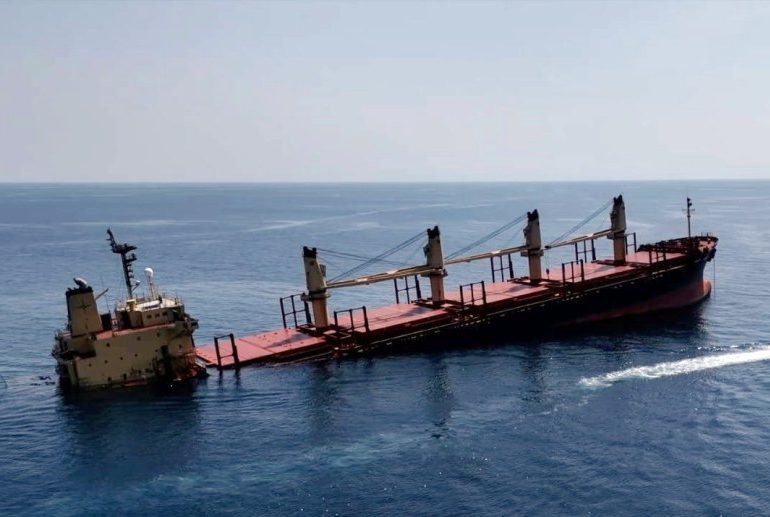A BRITISH cargo ship has sunk in the Red Sea after being attacked by Iran-backed Houthis.
The Rubymar cargo ship was supposedly heading north, from Khor Fakkan in the United Arab Emirates to Varna, Bulgaria, when it was bombarded.
EPABrit-registered cargo ship Rubymar (pictured) sank in the Red Sea[/caption]
EPAThe cargo ship was attacked by missiles two weeks ago[/caption]
EPAThe crew of the ship was forced to abandon the vessel[/caption]
EPAPicture showing Rubymar submerged after the attack[/caption]
AlamyThe Houthis claimed responsibility for blasting the ship[/caption]
The crew of the ship was forced to “abandon the vessel” after coming under attack off the coast of Yemen.
Soon after the attack, which took place two weeks ago, a statement from the UK Maritime Trade Operations (UKMTO) said: “UKMTO has received a report of an incident 35NM south of Al Mukha, Yemen.
“Military authorities report crew have abandoned the vessel.
“Military authorities are on scene assisting.
“Vessels are advised to transit with caution and report any suspicious activity to UKMTO.”
Houthi military spokesman Yahya Saree issued a statement claiming the attack, saying the vessel was hit with “appropriate missiles” and was at risk of potentially sinking.
He added: “The Naval forces of the Yemeni Armed Forces carried out a specific military operation, targeting the British ship RUBYMAR with a number of appropriate naval missiles.
“As a result of the extensive damage the ship suffered, it is now at risk of potential sinking.”
The Yemen-based terror outfit also claimed to have downed an American MQ-9 Reaper drone over al-Hudaydah within a day of the attack on the cargo ship.
A spokesperson for the group said: “Our air defences were able, with God’s help, to shoot down an American plane (MQ9) with a suitable missile while it was carrying out hostile missions against our country on behalf of the enemy entity.”
Yemen’s Iran-backed Houthi rebels have launched repeated strikes on international commercial shipping in the Red Sea since mid-November, purportedly in solidarity with Palestinians.
Several shipping companies have been forced to reroute their vessels passing through the Suez Canal and the Bab al-Mandeb Strait to take a longer alternative route around South Africa’s Cape of Good Hope.
Such changes have resulted in major delays and impacted companies including Suzuki, Tesla, BP, Shell, Qatar Energy, DHL, FedEx, Adidas, Marks & Spencer, Next, Primark, Sainsbury’s, and Target.
And the price of global shipping containers has jumped by more than 300 per cent between November and January.
The UK and the US have been carrying out joint airstrikes against the Houthis in recent weeks to try and stop their attacks on shipping.
Who are the Houthis?
THE Houthi rebels are terrorising the Red Sea by launching persistent missile and drone attacks on vessels and warships – but who are they?
The Shia militant group, which now controls most of Yemen, spent over a decade being largely ignored by the world.
However, since the outbreak of the Israel-Gaza war, they sprung from relative obscurity to holding roughly £1trillion of world trade hostage – turning one of the world’s busiest shipping lanes into an active warzone.
Their warped slogan is “Death to America, Death to Israel, curse the Jews and victory to Islam”.
Why are they attacking ships?
The rebel group has been launching relentless drone and missile attacks on any ships – including warships – they deem to be connected with Israel in solidarity with their ally, Hamas.
However, in reality, there have been frequent attacks on commercial vessels with little or no link to Israel – forcing global sea traffic to halt operations in the region and sending shipping prices soaring.
The sea assaults have threatened to ignite a full-blown war in the Middle East as intense ripples from Israel’s war in Gaza are felt across the region – with Iran suspected of stoking the chaos.
Houthi attacks in the Red Sea increased by 50 per cent between November and December as the rebel group’s chiefs pledged their assaults would continue until Israel stopped its offensive in Gaza.
And despite repeated threats from the West and joint US and UK strikes blitzing their strongholds in Yemen – Iran’s terror proxy appears undeterred.









